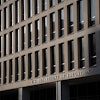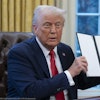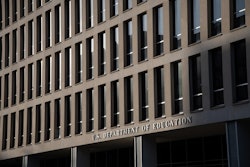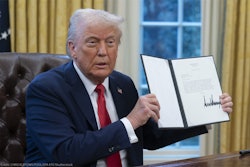 Lezli Baskerville, president and CEO of the National Association for Equal Opportunity in Higher Education (NAFEO)
Lezli Baskerville, president and CEO of the National Association for Equal Opportunity in Higher Education (NAFEO)
Advocates say they await the next director and outline why the position matters, what could be at stake the longer the job goes vacant, and how to make sense of the delay.
“The HBCU community is eagerly anticipating the selection of the executive director for the White House Initiative on HBCUs, and time is of the essence,” said Lezli Baskerville, president and CEO of the National Association for Equal Opportunity in Higher Education (NAFEO), an advocacy organization for HBCUs and Predominantly Black Institutions.
The Thurgood Marshall College Fund (TMCF), a nonprofit organization that supports publicly-funded HBCUs, reiterated Baskerville’s point.
“This position is critically important, helping to shape policy and deploy resources to better serve the students, faculty, and families of the greater HBCU community,” said Dr. Harry L. Williams, president and CEO of TMCF and the former president of Delaware State University. “TMCF looks forward to the President’s selection of the executive director for the White House Initiative on HBCUs as well as continuing our productive working relationship with the White House.”
Dr. Marybeth Gasman, the Samuel DeWitt Proctor Endowed Chair in Education and distinguished professor of education at Rutgers University, said that the delayed appointment loses out on HBCU momentum. With Vice President Kamala Harris as a graduate of Howard University, a well-known HBCU, many see this as a prime time moment for these institutions to seize.
“If the executive director is empowered by the administration, then the role is very important and can have considerable influence,” said Gasman, an expert on HBCUs as well as other minority serving institutions (MSIs). “And it’s very important to have the role filled right now—in fact, we are seeing a bit of a missed opportunity given the high visibility of HBCUs right now.”
 Dr. Ivory Toldson, professor of counseling psychology at Howard University and the former executive director of the Initiative under the Obama administration
Dr. Ivory Toldson, professor of counseling psychology at Howard University and the former executive director of the Initiative under the Obama administration
“The Initiative has the personnel there to do the work, but the executive director’s advantage is that the president appointed them along with all these secretaries and other high-profile roles,” said Toldson, who is also the director of education innovation and research at the National Association for the Advancement of Colored People (NAACP). “So, right now, there is no one within the Initiative who is a presidential appointee and a peer to the people in charge of pretty large budgets.”
Baskerville agrees.
“While there are tremendous persons in the Office of the President who have been assigned to work with the HBCU community and are doing a great job, those outstanding executives are not substitutes for a full-time, dedicated, first-rate, seasoned senior executive who can work with a diverse board of HBCUs and corporate, business, non-profit, and other leaders who will serve on the President’s Board of Advisors on HBCUs,” she said.
With Congress passing the $1 trillion infrastructure bill that was signed on Monday by President Biden, Toldson outlined that the executive director could hold more sway in making sure federal agencies think about HBCUs when using their funding to help address racial disparities.
“The bill in the Senate right now is anticipated to have some money directed to all higher education institutions, including HBCUs,” said Toldson. “So, it’s important to have the executive director in place when both those bills are passed and the new budget comes out because that person will be advocating across the federal agencies for funding.”
From the Department of Justice to NASA to the National Institutes of Health, the heads of these federal institutions will be considering how to use the money they get. Toldson said an executive director who understands HBCUs and has leverage could make a big difference.
Author and business leader Johnathan M. Holifield was the last to lead the initiative during the Trump administration. He is currently the senior vice president at Bitwise Industries.
“[The next executive director] must have an uncanny instinct for people and politics, in that they must be able to work with diverse executives in every federal department and agency, to follow appropriated dollars into the agencies, weigh in on the proposed budgets, and follow the dollars out of the agencies,” said Baskerville.
Baskerville said that the recent increase in philanthropic support to HBCUs is another opportunity for the executive director to grab ahold of now. MacKenzie Scott recently gave about $150 million to HBCUs, drawing widespread attention to the work of these colleges in helping break cycles of poverty among Black communities. The Black Lives Matter protests last year further put HBCUs in the national spotlight.
“The executive director must also assign a member of his/her team to harness the tremendous corporate goodwill toward HBCUs during this season and to grow and sustain corporate as well as philanthropic relationships for HBCUs,” Baskerville added.
To Toldson, one promising area that the director could also make headway on is pushing those HBCUs designated as R2 universities, meaning they have high research activity, up to R1 status universities, or those with the highest level of research output in the country. No HBCU is an RI institution yet. Toldson said that is a missed opportunity.
“A lot of the grants awarded for research go to R1 institutions, but about a dozen HBCUs are aspiring to become R1 institutions,” added Toldson. “If under the Biden administration we get the first R1 HBCU, that could be something the Biden administration could also brag about.”
Regarding what the Biden administration should look for in the next director, Gasman stressed finding someone respected across the diversity of the HBCU community. She would like someone who attended an HBCU and who is “steeped in data, persuasive, and cognizant of the issues that HBCUs face.”
And one more thing.
“I’d love to see a woman in this role,” said Gasman. “It’s time, and there are plenty of highly qualified African American women who could serve in this role.”
Some in the HBCU community had suggested the president of Spelman College, Dr. Mary Schmidt Campbell, who announced this summer that she will retire at the end of this academic year. While Toldson said he doesn’t know of specific names being considered, he like Gasman said the executive director should have ideally worked at or attended an HBCU.
“Also someone who understands government and how the federal budget works to then identify where funding opportunities for HBCUs are across agencies,” said Toldson. “A lot of the work of the executive director is about building good relationships, both with the HBCU community and their leadership as well as the federal agency heads.”
It will be key, he added, for the person to creatively think about how to expand support to HBCUs and showcase their value. When Toldson was the Initiative's executive director under Obama, he created an All Star program that identified leading HBCU scholars, aimed at highlighting the talent that comes out of these institutions.
Dr. Robert T. Palmer, professor and chair of educational leadership and policy studies at Howard University, also stressed that the next executive director needs to be skilled at communicating the significance of HBCUs to America at large.
“We wouldn’t have Black lawyers, teachers, and doctors, folks who contribute to the rich history of this nation, to the functionality of this nation, without HBCUs,” he said, citing studies showing HBCUs disproportionately graduate more Black professionals than do Predominantly White Institutions. “We also know that HBCUs benefit the local economies where they are situated. So, we need someone who can talk about all those contextual factors when expressing the importance of HBCUs to America.”
He added that the nation is moving in a new demographic direction.
“Let’s not forget that the country is becoming more diverse, and many more students will go to HBCUs and MSIs,” said Palmer. “So, we need to be sure that they have the resources to compete and continue to do the work they do.”
But regarding the lag in naming the next executive director, Toldson said that he’s surprised and unclear on what has led to the slow timeline: “I suspect that they should announce the person pretty soon, but I’m not sure why the delay.”
Yet the Biden administration has already named the heads of other White House Initiatives, such as Krystal Ka‘ai to lead the White House Initiative on Asian Americans, Native Hawaiians, and Pacific Islanders. In addition, the White House Initiative on Educational Excellence for African Americans, which was previously led by David Johns, is still vacant. Among many advocates and experts, the absence of both that position as well as the head of the HBCU Initiative is a concern.
Toldson noted that perhaps the social spending bill in Congress may have ended up with more funding for HBCUs if the head of the Initiative had been there to help negotiate. He pointed out that Biden's initial budget proposal included making two years of HBCUs as well as community colleges tuition free, though both programs have since been cut in the latest version of the bill.
"You'd want someone there to advocate for future budget proposals to fight for that to stay in," he said. "And who knows, if someone was in place at the Initiative, they may have been able to reach the members of Congress to keep that much funding for students at HBCUs in there. And that would be something else."
While Palmer recognized the delay as well, he cautioned against seeing the still-vacant position as a sign that the Biden administration is not paying as much attention to HBCUs.
“I don’t think it diminishes the importance of HBCUs and how the Biden-Harris administration is thinking about them,” said Palmer. “I think there was just a delay in the aftermath of the Trump administration. But I think there’s the vision among Democrats to support HBCUs.”
He emphasized that there are many moving parts in Congress.
“I think Biden and Harris are choosing to focus their attention on getting their agenda through, making sure they’re strategizing to get things done and build unity among Democrats,” he said. “So, other things may have taken longer, but I don’t think it signifies that Biden is placing a lack of importance on HBCUs.”
Gasman similarly did not anticipate that it would take months for the position to be filled. She additionally pointed to the heads of many other federal divisions already being announced.
“I was someone who said give the Biden administration time given all the other issues they are dealing with,” said Gasman. “However, at this point, I think they have had enough time and an executive director should be named.”
Also like Toldson, she expressed uncertainty about what led to the lag.
“All I can assume is that coming into the office after the mess that was the Trump administration has to be terrible,” said Gasman. “The transition was not normal, respectful, nor easy. As mentioned, I think taking some time was fine, but it’s time to act at this point. I say this as someone who thinks the Biden administration has accomplished a lot already, and we can’t forget that.”
Diverse reached out to the Initiative to ask for comment, but the Department of Education Press Office declined an interview and instead referred to the President’s September 3, 2021 executive order on the Initiative.
Rebecca Kelliher can be reached at rkelliher@diverseeducation.com.
















